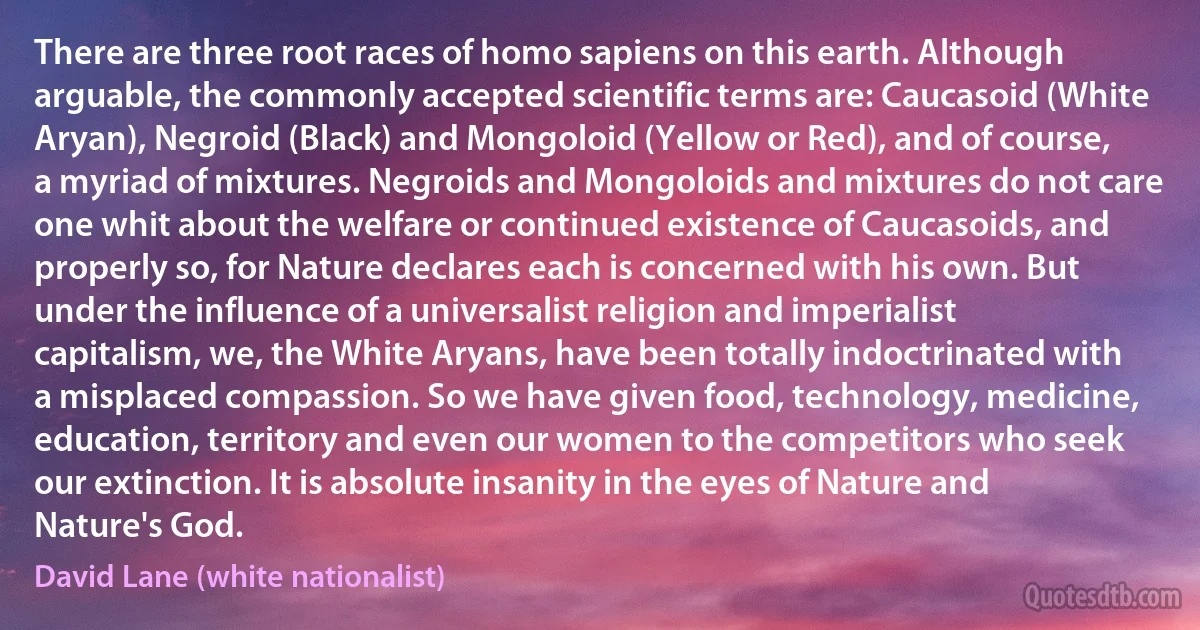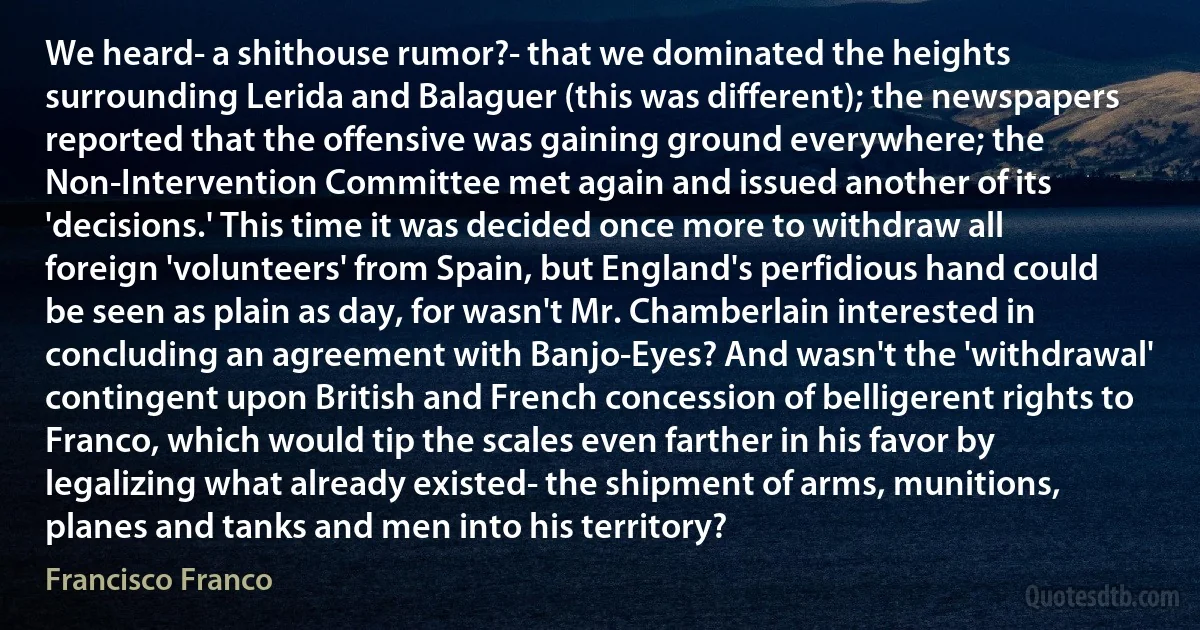Territory Quotes - page 21
It is no doubt true that you cannot "draw an indictment against a whole people". Yet the story of Prussian policy through many generations is dark indeed. "Prussia's whole policy", declared Metternich, "consisted in the enlargement of her territory and the extension of her influence; to attain it, she was willing to adopt any manner of means and pass over the law of nations and the universal principles of morality." What Frederick the Great began was followed by his successors at the end of the century, and continued by Bismarck. It inspired the Kaiser and his advisers in 1914. It was soon to be surpassed in cynicism and crime by Hitler.

Harold Macmillan
Following the receipt of the gladsome news great joy and enthusiasm seemed to fill every heart; and during the night following, the occasion was celebrated by immense processions of men and boys marching through the principal streets to the music of many brass bands, the firing of cannon, and the discharge of anvils. It is needless to say all of us New Mexicans heartily joined in to swell the throng, which continued its hilarity throughout the night. No thought then entered my mind that in the short space of three years I would be a delegate in Congress, thereby admitted to the presence of the greatest statesman in consultation about affairs in the Territory of New Mexico.

Francisco Perea
Colonel Perea, was early in the summer of the year 1865, renominated as a candidate to the Thirty-ninth Congress. He made a vigorous campaign and would have been triumphantly elected had he refused to support a few of his most intimate friends, among whom was General Carleton, then commander of the military department, with headquarters at Santa Fe. The opposition concentrated their efforts against General Carleton... His character as a soldier was assailed in all portions of New Mexico. ...Colonel Perea failed of reëlection, but his standing at Washington was such that he was able to control the Federal appointments for the Territory until the close of Johnson's administration in 1869.

Francisco Perea
A Puerto Rican writer from New York is doubly dislocated: first, there is dislocation from Puerto Rico; secondly, there is Puerto Rico's dislocation from itself. Puerto Rico is a colony of the United States. It may be a truism that you can't go home again, but it's especially true when home is an occupied territory. A Puerto Rican writer from New York, like myself, is twice alienated. I never forget that in this country I belong to a marginalized, silenced, even despised community; yet, in Puerto Rico, as a "Nuyorican” poet, I am marginalized again, for reasons related and unrelated to the island's colonial status...

Martín Espada
The population of these Pueblos will average nearly five hundred souls each (though some hardly exceed one hundred), making an aggregate of nine or ten thousand. At the time of the original conquest, at the close of the sixteenth century, they were, as has been mentioned, much, perhaps ten-fold, more numerous. Ancient ruins are now to be seen scattered in every quarter of the territory: of some, entire stone walls are yet standing, while others are nearly or quite obliterated, many of them being now only known by their names which history or tradition has preserved to us.

Josiah Gregg
By an observation of an eclipse of one of Jupiter's satellites, on the night of the 25th of March, in latitude 350° 51' 30", I found that we were very near the 100th degree of longitude west from Greenwich. On the following day, therefore, we celebrated our entrance into the United States territory. Those who have never been beyond the purlieus of the land of their nativity, can form but a poor conception of the joy which the wanderer in distant climes experiences on treading once more upon his own native soil! Although we were yet far from the abodes of civilization, and further still from home, nevertheless the heart within us thrilled with exhilarating sensations; for we were again in our own territory, breathed our own free atmosphere, and were fairly out of reach of the arbitrary power which we had left behind us.

Josiah Gregg
This way, Godse (born 1910) exacted ‘punishment' for Gandhi's alleged pro-Muslim policies. These were particularly his acceptance in June 1947 of the plan to partition India into a secular state, retaining the name India and a Muslim state called Pakistan; and more immediately his fast, earlier in January 1948, on behalf of the safety of the Delhi Muslims threatened by angry Hindu refugees pouring in from Pakistan, and in support of Pakistan's demand that India pay them ₹550 million as their share from the treasury of British India. Under protest, the Indian Government had given in to the latter demand because of Gandhi's pressure, and in spite of the presence of Pakistani invasion troops on Indian territory in Kashmir. Surely this was the first time in history that a country deliberately financed its battlefield opponent, and not everyone was pleased with this display of Gandhian values.

Koenraad Elst
Naval forces are able, without resorting to diplomatic channels, to establish offshore anywhere in the world, air fields completely equipped with machine shops, ammunition dumps, tank farms, warehouses, together with quarters and all types of accommodations for personnel. Such task forces are virtually as complete as any air base ever established. They constitute the only air bases that can be made available near enemy territory without assault and conquest; and furthermore, they are mobile offensive bases, that can be employed with the unique attributes of secrecy and surprise - which attributes contribute equally to their defensive as well as offensive effectiveness.

Chester W. Nimitz
The Harappan civilization is situated deep within Indo-European ("Indo-Aryan") territory. The closest non-Indo-European families are at some distance:... There is no linguistic, archaeological or anthropological evidence indicating that the Harappan civilization was supplanted by a linguistically different race of people: on the contrary, archaeologists and anthropologists insist on continuity in the anthropological situation from Harappan times well into post- Vedic times. In these circumstances, the Harappan civilization should have been assumed to be Indo-European until proved otherwise. However, in gross violation of normal scholarly practice, it has been assumed to be non-Indo-European.

Shrikant Talageri
As the complexion of European politics seems now (from letters I have received from the Marqs. de la Fayette, Chevrs. Chartellux, De la Luzerne, &c.,) to have a tendency to Peace, I will say nothing of war, nor make any animadversions upon the contending powers; otherwise, I might possibly have said that the retreat from it seemed impossible after the explicit declaration of the parties: My first wish is to see this plague to mankind banished from off the Earth, and the sons and Daughters of this world employed in more pleasing and innocent amusements, than in preparing implements and exercising them for the destruction of mankind: rather than quarrel about territory let the poor, the needy and oppressed of the Earth, and those who want Land, resort to the fertile plains of our western country, the second Promise, and there dwell in peace, fulfilling the first and great commandment.

George Washington
In an age when national greatness depends not on numbers or on territory, but on intelligence, the development of intelligence is a duty the neglect of which will hazard our national position. In a day when thought, not force, is the ruler of mankind, and when in domestic government numbers are more powerful than wealth, it is of the most vital importance to the stability of our institutions that that thought should be sound and those numbers enlightened.

Robert Gascoyne-Cecil, 3rd Marquess of Salisbury
First, is the danger of futility: the belief there is nothing one man or one woman can do against the enormous array of the world's ills - against misery, against ignorance, or injustice and violence. Yet many of the world's great movements, of thought and action, have flowed from the work of a single man. A young monk began the Protestant Reformation, a young general extended an empire from Macedonia to the borders of the earth, and a young woman reclaimed the territory of France. It was a young Italian explorer who discovered the New World, and 32-year-old Thomas Jefferson who proclaimed that all men are created equal. "Give me a place to stand," said Archimedes, "and I will move the world." These men moved the world, and so can we all.

Robert F. Kennedy
Long centuries before any foreigner had settled in India, the unity of the country was materialised in symbols. What more suggestive story than that, for instance, of Sati, Siva's wife, whose body, divided, after her death, in fifty-one pieces, is lying still in fifty-one different places, therefore revered as "tirthasthans,” throughout the Indian Peninsula? One lies near Peshawar, one in Kamakhya, not far from India's eastern boundaries; one in Benares, one in the very extreme South, others here and there. Fifty-one pieces, but one body; fifty-one "tirthasthans” in the name of the same Goddess, scattered over the same territory. Indeed, among the different interpretations that can be given of the legend of Sati, one can take it in this light: Sati is India herself, personified; India's soil, sacred from end to end, is, with all its variety, the actual body of one great Goddess... And Indian nationalism means: devotion to this great Goddess.

Savitri Devi
The first was the raid by U.S. Navy planes in June on Pathet Lao headquarters in Laos in retaliation for shooting down two reconnaissance planes. We would not hesitate to shoot down reconnaissance planes over our own territory; such overflights are a clear violation of international law. But the U.S. now seems to operate on the principle that invasion of other people's skies is our right, and efforts to interfere with it (at least by weaker powers) punishable by reprisal. This is pure "might is right" doctrine...

I. F. Stone
If you look at human society, it is very easy, of course, to compare our warfare and territoriality with the chimpanzee. But that's only one side of what we do. We also trade, we intermarry, we allow each other to travel through our territory. There's an enormous amount of cooperation. Indeed, among hunter-gatherers, peace is common 90 percent of the time, and war takes place only a small part of the time. Chimps cannot tell us anything about peaceful relations, because chimps have only different degrees of hostility between communities. Whereas bonobos do tell us something; they tell us about the possibility of having peaceful relationships.

Frans de Waal
With This Bridge comenzado a salir de las sombras; hemos comenzado a reventar rutina costumbres opresivas y a aventar los tabues; hemos comenzado a acarrear con orgullo la tarea de deshelar corazones y cambiar conciencias (we have begun to come out of the shadows; we have begun to break with routines and oppressive customs and to discard taboos; we have commenced to carry with pride the task of thawing hearts and changing consciousness). Mujeres, a no dejar que el peligro del viaje y la inmensidad del territorio nos asuste-a mirar hacia adelante y a abrir paso en el monte (Women, let's not let the danger of the journey and the vastness of the territory scare us-let's look forward and open paths in these woods). Caminante, no hay puentes, se hacen puentes al andar (Voyager, there are no bridges, one builds them as one walks).

Gloria E. Anzaldúa
The United States should have an equal and simultaneous support for both the legitimate security concerns of Israel, and the human rights, dignity and economic opportunities of the Palestinian people... I do not believe the settlements on the West Bank are legal. Also, I would rescind the president's affirmation of sovereignty of Israel over the Golan Heights. I understand the occupation of the Golan Heights, but only until there is a stable government in Syria with whom one can negotiate. According to international law, the occupation of a territory does not give the occupying country a right to annex it. Also, according to international law, the resources of the occupied territory are to be used for the good of those living there. I also do not support the blockade of Gaza.

Marianne Williamson



